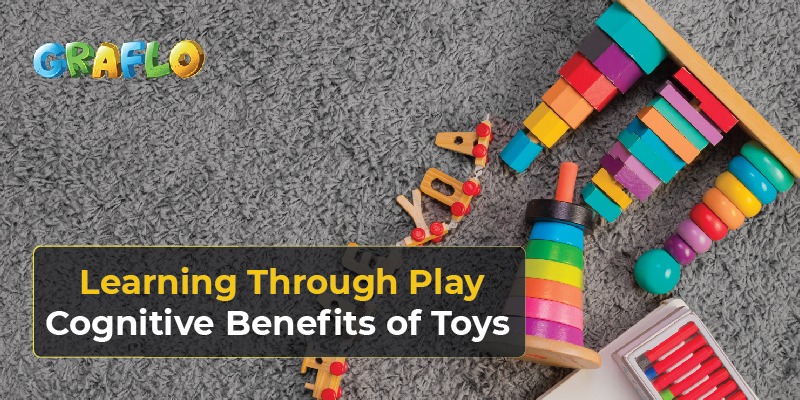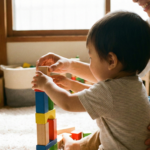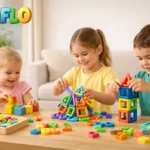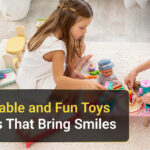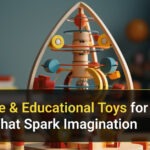In today’s fast-paced world, where screens often dominate children’s attention, the importance of learning through play is being rediscovered by parents and educators alike. Play isn’t just fun, it’s fundamental. It shapes how children think, solve problems, and make sense of the world around them. The right learning toys can spark creativity, strengthen memory, and develop essential cognitive skills that last a lifetime.
The Science Behind Learning Through Play
Play is more than a leisure activity; it’s how children learn best. Neuroscientists have found that play stimulates neural connections in the brain, helping kids absorb and retain new information effortlessly. When children engage in play that challenges their thinking, like building blocks, puzzles, or interactive games, they’re actually strengthening brain pathways related to logic, reasoning, and problem-solving.
Learning toys play a vital role here. They transform abstract concepts into tangible experiences. For example, when a child stacks blocks, they aren’t just building a tower; they’re understanding balance, gravity, and spatial awareness. Through simple play, the brain is actively constructing knowledge.
How Learning Toys Enhance Cognitive Development
The cognitive benefits of learning toys go far beyond entertainment. Each play experience contributes to specific mental skills that support lifelong learning.
Memory and Concentration
Games that require matching, sequencing, or recalling patterns strengthen working memory and focus. Memory-based toys and activities encourage children to pay attention to details and retain information for longer periods.
By consistently engaging in such activities, children improve their ability to recall instructions and follow multi-step tasks with ease. Over time, these exercises help boost academic performance by enhancing both attention span and information retention.
Problem-Solving Skills
Toys like puzzles, LEGO sets, and STEM kits challenge children to think critically and find creative solutions. As they experiment and fail, then try again, they develop persistence and analytical thinking, key traits for academic success.
This process of trial and error teaches resilience, patience, and adaptability, skills that extend beyond playtime into real-world problem-solving. When children overcome challenges independently, they gain confidence in their own reasoning abilities.
Language and Communication
Pretend-play sets, storytelling cards, and board games encourage children to express ideas, describe actions, and engage in dialogue. Learning toys that promote role-play can boost vocabulary and social communication, laying a foundation for strong literacy skills.
Through imaginative play, kids learn to organize their thoughts, form narratives, and communicate effectively. These verbal interactions not only build language fluency but also foster empathy and understanding of different perspectives.
Logical and Mathematical Thinking
Counting blocks, shape sorters, and coding toys help children grasp basic math and logic concepts early. They start to recognize patterns, cause-and-effect relationships, and numerical order, all through hands-on play.
As they manipulate shapes or solve coding challenges, children learn to apply logic systematically. This strengthens reasoning skills that are essential for later success in science, technology, and mathematics.
Creativity and Imagination
Art kits, building sets, and open-ended learning toys allow children to explore their imagination freely. By creating unique designs or stories, they learn to think outside the box and approach challenges with originality.
Encouraging imaginative play nurtures innovation and self-expression, qualities that help children adapt and thrive in an ever-changing world. It reminds them that there’s no single “right” way to solve a problem, only endless possibilities.
Fine Motor and Coordination Skills
Manipulative toys like threading beads, stacking blocks, or magnetic tiles help refine children’s fine motor control and hand-eye coordination. These small yet precise movements strengthen the muscles needed for writing, drawing, and other daily activities.
As children improve their dexterity through play, they also build patience and concentration. Developing these motor skills early supports overall learning readiness and independence.
The Role of Play in Emotional and Social Intelligence
Cognitive development doesn’t happen in isolation. Play also teaches children to manage emotions, collaborate, and empathize with others. When kids play together, they learn to take turns, share resources, and negotiate rules. These social experiences help develop emotional regulation and perspective-taking.
Learning toys such as cooperative board games or group building sets foster teamwork and communication. They teach that success often comes from collaboration, not competition. This emotional awareness, combined with cognitive growth, helps children thrive in both school and life.
Learning Toys for Different Stages of Development
Not all play looks the same at every age. Choosing the right learning toys for each developmental stage ensures children get the most cognitive benefit.
Infants (0–2 years):
Toys that stimulate the senses, like rattles, textured balls, and stacking rings, help babies explore the world and improve hand-eye coordination.
From the Graflo Toys catalog, you might reference sensory items such as a Wooden Painting Kit (Glow in the Dark Arts & Crafts Set) (for older infants/toddler transition) or soft art & craft starter materials that introduce color and touch.
Toddlers (2–4 years):
Shape sorters, building blocks, and simple puzzles develop problem-solving and fine motor skills. From Graflo’s offerings, Ultimate Magnetic Building Blocks – 100 PCS STEM Montessori Magnet Cubes is a great example, as it allows toddlers (around 3 years) to grasp the basics of shape, magnetism, and structure.
Preschoolers (4–6 years):
Pretend-play sets, counting games, and storytelling kits nurture imagination, early math, and language skills.
On Graflo’s site, Alphabet Bracelet Making Kit (with beads and charms) is a good example, it supports letter recognition, sequencing, and creative storytelling through jewelry creation.
School-age children (6+ years):
STEM kits, science experiments, and coding robots challenge logical thinking and encourage independent learning.
Graflo lists products like the Ultimate Magnetic Tiles Set – 110 PCS STEM Toy, and Spin Art Machine Kit, these encourage inventive construction, experimentation with shapes, motion, and cause-effect relationships.
Balancing Screen Time and Hands-On Play
While digital tools can be educational, they shouldn’t replace traditional play. Real-world interaction, touching, building, experimenting, is how children fully engage their senses and deepen understanding. Parents can create a balanced routine by combining educational apps with hands-on learning toys that encourage creativity and independent thought.
Encouraging children to build, create, and explore offline helps strengthen attention spans and imagination, qualities often diminished by excessive screen use. The goal isn’t to eliminate technology, but to complement it with tangible, interactive learning experiences.
The Lifelong Impact of Learning Through Play
When children play with intent and curiosity, they’re not just passing time, they’re developing essential cognitive foundations for the future. The problem-solving, communication, and reasoning skills gained from learning toys translate into better academic performance and stronger life skills.
Play also keeps learning joyful. When children enjoy the process of discovery, they develop a natural love for learning, a mindset that fosters resilience and adaptability throughout life.
Final Thoughts
Learning through play isn’t a modern trend; it’s an age-old truth backed by science and observation. Choosing high-quality learning toys offered by Graflo Toys can turn playtime into a powerful educational experience that supports brain development, emotional growth, and lifelong curiosity. Graflo’s range, involving durable magnetic tiles, engaging craft kits, and safe, hands-on STEM toys, embodies that ideal blend of fun and learning.
Investing in the right toys today means nurturing the thinkers, creators, and problem-solvers of tomorrow. With Graflo Toys, you’re not just buying a toy; you’re giving children tools to explore, imagine, and learn. Because when learning feels like play, the possibilities are endless, and with Graflo’s thoughtfully designed learning toys, those possibilities are closer than ever.

